 Petzlover
Petzlover Catahoula Leopard is originated from United States but Gaddi Kutta is originated from India. Both Catahoula Leopard and Gaddi Kutta are having almost same height. Both Catahoula Leopard and Gaddi Kutta are having almost same weight. Both Catahoula Leopard and Gaddi Kutta has almost same life span. Both Catahoula Leopard and Gaddi Kutta has same litter size. Catahoula Leopard requires Low Maintenance. But Gaddi Kutta requires High Maintenance
Catahoula Leopard is originated from United States but Gaddi Kutta is originated from India. Both Catahoula Leopard and Gaddi Kutta are having almost same height. Both Catahoula Leopard and Gaddi Kutta are having almost same weight. Both Catahoula Leopard and Gaddi Kutta has almost same life span. Both Catahoula Leopard and Gaddi Kutta has same litter size. Catahoula Leopard requires Low Maintenance. But Gaddi Kutta requires High Maintenance
 This working dog breed originates from America’s Deep South. In fact it was originally named after a small village in the state of Louisiana and was made the state’s official dog in 1979. The dog is believed to have come from the Mastiff and Greyhound.
This working dog breed originates from America’s Deep South. In fact it was originally named after a small village in the state of Louisiana and was made the state’s official dog in 1979. The dog is believed to have come from the Mastiff and Greyhound.
Known as war dogs they were left with local tribes who crossed them with wolves, and French Beauceron blood was also included.
A number of Catahoula dog Associations were started and the Louisiana Catahoula Cur Association was formed in 1976, followed by others. These Associations work to promote the breed. In 1995 the United Kennel Club was the first national dog registry to recognize the Catahoula.
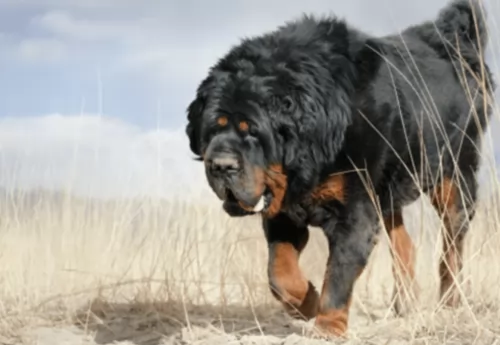 The Gaddi Kutta is mountain dog of the mastiff line from northern India. They are mostly found in the western Himalayas and Himachal Pradesh. It is also seen in Nepal and often named the Indian Panther Hound and the Mahidant Mastiff. They were bred to hunt but because of their strength and intelligence they are used to guard and herd goats and sheep. They are strong enough to defeat or scare off a panther or snow leopard and intelligent enough to work independently in finding strays and bringing them back to their pens. They have been known to protect herds of cattle from bears and leopards.3 or 4 of them working together can handle the guard duties for thousands of cattle.
The Gaddi Kutta is mountain dog of the mastiff line from northern India. They are mostly found in the western Himalayas and Himachal Pradesh. It is also seen in Nepal and often named the Indian Panther Hound and the Mahidant Mastiff. They were bred to hunt but because of their strength and intelligence they are used to guard and herd goats and sheep. They are strong enough to defeat or scare off a panther or snow leopard and intelligent enough to work independently in finding strays and bringing them back to their pens. They have been known to protect herds of cattle from bears and leopards.3 or 4 of them working together can handle the guard duties for thousands of cattle.
Their reputation precedes them – as ferocious and courageous, unmatched in their instincts to protect what is theirs. In the line of the Mastiffs and Molosser, the Gaddi is powerful and agile, and considered to be of ancient heritage though no one is sure what their origin is. The local myth is that dogs were crossed with tigers. It is more likely that dingo-like wild hounds from the Himalaya were crossed with the Tibetan Mastiff to create the Gaddi Kutti. Also found in Pakistan, most lines of the breed have been crossed with others including the German Shepard and the Bully Kutta. Outside of the Himalayas there are not many if any pure lines. The Gaddi Kutta is a good family dog if you socialize him as a puppy. He will be gentle, calm and intuitive with his family, but aggressive toward strangers and other dogs.
 Known as the Leopard dog because of the distinctive spotted patches on his short to medium length coat, this interesting looking spotted dog can have a coat of many colors such as solid colors, brindle and a blend of several colors including blue merle and red merle, black and tan.
Known as the Leopard dog because of the distinctive spotted patches on his short to medium length coat, this interesting looking spotted dog can have a coat of many colors such as solid colors, brindle and a blend of several colors including blue merle and red merle, black and tan.
He is a muscular and athletic dog of medium to large size with sturdy legs and deep chest. He stands at 56 – 68cm and weighs 20 – 50kg. Many of these dogs have webbing between the toes which gives them an advantage when running through marshy areas or when swimming.
With his floppy ears, the tail is long or bobtailed. An unusual aspect with the dog is his eyes – having what is known as marbled glass eyes which are blue or blueish-white in color.
The Catahoula Leopard Dog can be stubborn and he is also energetic, fearless and highly intelligent. You’ll want to have him trained and socialized early as then he becomes a more relaxed, obedient dog. He is an assertive dog but not aggressive by nature.
Catahoulas in general are even tempered and they are willing to share their space with children in the home as well as other pets. They are protective of children and of their entire human family, making good watchdogs.
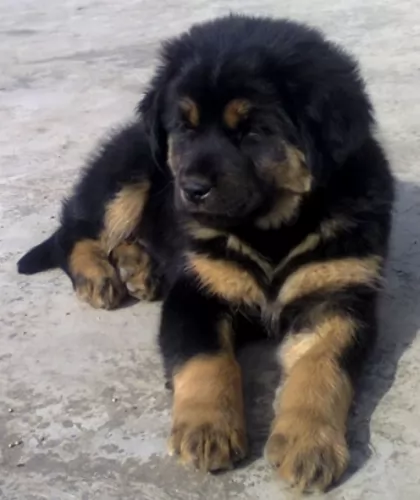 The Gaddi Kutta is a mastiff but he is athletic, has tremendous speed and stamina. He is muscular and deep-chested, leaner than most of the mastiff lines. Their ears can be either natural or cropped, on a very large head. One of the most important traits of the Gaddi Kutta is the massive, arched neck that protects them from predators. He is sturdy with a heavily feathered, thick tail curling over the back.
The Gaddi Kutta is a mastiff but he is athletic, has tremendous speed and stamina. He is muscular and deep-chested, leaner than most of the mastiff lines. Their ears can be either natural or cropped, on a very large head. One of the most important traits of the Gaddi Kutta is the massive, arched neck that protects them from predators. He is sturdy with a heavily feathered, thick tail curling over the back.
They are massive, wolf like dogs, fiery and huge but intelligent and faithful to their people. They are scary even when they are trying to be affectionate. The muzzle is strong, and the mane is thick. The Gaddi has long, heavy legs and very large feet that are feathered, making him even more intimidating.
There are two types of Gaddi Kutti – the longhaired and the shorthaired. The longhaired is the most common and has a fuller coat with long feathering on the tail, legs and chest and some feathering on the feet. They are all usually solid colors of yellow, fawn and cream or they could be piebald, brown or brindle. They have a woolly dense undercoat.
 The Catahoula makes a fine family pet but he is a dog which shouldn’t be left outside day after day. He is a companion dog and won’t thrive without the companionship of his human family.
The Catahoula makes a fine family pet but he is a dog which shouldn’t be left outside day after day. He is a companion dog and won’t thrive without the companionship of his human family.
He is highly intelligent and also energetic, and if you want him to be relaxed and amicable around other humans and pets in the home he will require training and socialization. For training and ownership, the Catahoula Leopard will require a strong, firm, confident personality and he’ll be an obedient, loving and loyal companion.
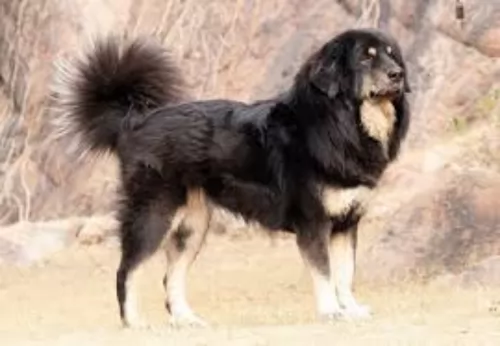 They are not always great with children, but they will protect own children in their family. Do not leave unattended.
They are not always great with children, but they will protect own children in their family. Do not leave unattended.
They have the ability to bring down a wolf or even a bear or snow leopard.
Because of his size, temperament and coat he is not very adaptable. He is good outside in a colder region and with a lot of land to roam, but not in a hot region or in an apartment.
This breed is very smart, learns quickly on his own.
 Your Catahoula Leopard is a healthy dog breed and with good care he can live to be 10 to 14 years of age. However, there are a number of reasons why some of the healthiest dogs can become ill.
Your Catahoula Leopard is a healthy dog breed and with good care he can live to be 10 to 14 years of age. However, there are a number of reasons why some of the healthiest dogs can become ill.
Knowing about these illnesses means you can take action and minimize the pain and suffering your pet might have to otherwise endure.
You’ll notice your pet shaking his head and maybe even scratching his ears. Ear infections are more evident in dogs with floppy ears and there can be an ear discharge. When left untreated, the ears can become painful and then it is time to get him to the vet.
This is a common illness in dogs and can be terribly uncomfortable and debilitating for your pet as he tries to urinate all the time with no success. Signs of UTI can include this excessive urination with little urine coming out, lethargy and discomfort. Take your pet immediately to the vet to be checked over.
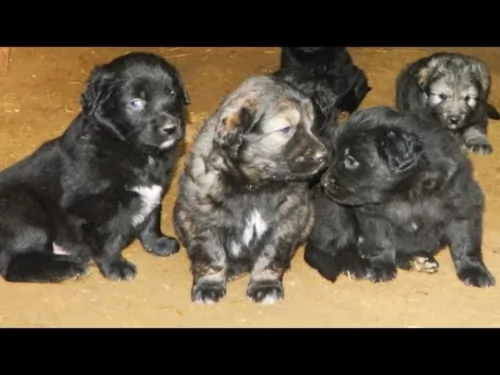 The breed is prone to obesity if they do not get enough exercise or a decent diet.
The breed is prone to obesity if they do not get enough exercise or a decent diet.
 A dog makes such a splendid pet, willing to give loyal and loving friendship to humans, even those who don’t treat him properly. When you think of the unconditional love your Catahoula Leopard dog will give you, surely you want to provide him with good food and shelter.
A dog makes such a splendid pet, willing to give loyal and loving friendship to humans, even those who don’t treat him properly. When you think of the unconditional love your Catahoula Leopard dog will give you, surely you want to provide him with good food and shelter.
It can be devastating if your dog goes missing, and if he has no identification, to find him might only mean telling people what he looks like. Rather put a collar on him and an ID tag so that your chances of getting him back are just that much better.
You can also have him micro-chipped by your veterinarian and these chips have a unique code which can provide useful information on your pet.
Make sure that your pet is vaccinated as a puppy against diseases which could be deadly such as rabies.
If you have no intention of allowing your Catahoula Leopard to have puppies, rather have him neutered or spayed if its a female. It is better for them and they can live longer and be free of some ailments that at un-spayed or un-neutered dog may get.
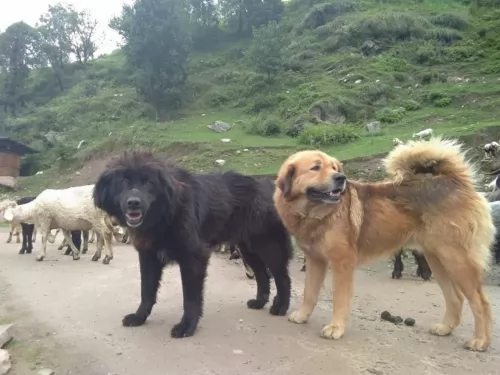 Should feed a high quality dry puppy food for large dogs. Give 1-2 cups per day split into 2-3 meals.
Should feed a high quality dry puppy food for large dogs. Give 1-2 cups per day split into 2-3 meals.
Again you want to feed high quality dry adult dog food for large dogs. Give 3-4 cups per day split into 2 meals. Watch for obesity and if your Gaddi Kutta is gaining too much weight, cut back.
The Gaddi Kutti seems to be immune to the most common of canine diseases.
This is a breed of very large dogs that need daily exercise by walking and running. However, since they have been fairly isolated in India and the Himalayas, he has not been exposed to organized dog play and exercise such as agility, dock jumping or field trials. He would probably succeed at all three.